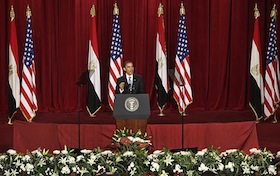The Bigger Picture of the Administration's Mideast Policy
September 1, 2010
Featured Image
Today's top nuclear policy stories, with excerpts in bullet form.
Stories we're following today: Wednesday September 1, 2010
Trying to Buck Odds, Obama Takes On 3 Big Mideast Tasks - David Sanger of The New York Times [link]
- President Obama is attempting a triple play this week that eluded his predecessors over the past two decades: simultaneous progress on the most vexing and violent problems in the Middle East — Israeli-Palestinian peace, Iraq and Iran — in hopes of creating a virtuous cycle in a region prone to downward spirals. History shouts that all the odds are against him.
- While Mr. Obama’s thinking contains elements of the logic that drove his predecessors to pursue similar strategies, there are also some critical differences, and success or failure hinges on how significant those turn out to be.
- Those differences include evidence that the United States is truly pulling out of Iraq, far tougher sanctions on Iran and the tentative emergence of a working Palestinian government in the West Bank.
- The main problem is that success is not assured in any of the fronts in question, and the dynamic among them is unpredictable.
- “It’s hard to make the case that progress in the peace process is going to resolve the political stalemate in Iraq, or force the Iranians to reconsider their nuclear program,” said Martin S. Indyk. “But I think you can claim that success would help make headway…The risk — the one we forgot in the Clinton years — is that failure can also diminish your credibility.”
US Strategic Opportunity in Pakistan Flooding Relief - The Washington Note [link]
- George Soros is working hard to help the Obama administration realize that a billion dollars spent now, carefully, and in a structure that could create a systemic improvement in Indus River water management helping India and Pakistan would be welcomed by the currently besieged victims in Pakistan of historic-level flooding and help preempt a greater tilt towards instability in South Asia than already exists.
- The critical need for aid 'now' combined with a unique opportunity for the United States to constructively improve the lot over the near and long term of people who don't think well of America makes great sense.
- As Steve Coll wrote in the New Yorker, "So far, the Obama Administration has displayed all the right instincts, by rushing relief to civilians, affirming the primacy of the country's elected leaders, and galvanizing other governments to pitch in. As the waters recede, and the immediate crisis passes, however, the challenge will be to muster international investment to repair Pakistan's infrastructure and catalyze its economic recovery."
- An added benefit along the way is that this effort could help build some much needed trust between Pakistan and India.
Nuclear security remains bulk of Energy budget - Katherine McIntire Peters in Government Executive [link]
- Most of the Department of Energy's budget remains firmly committed to securing the nation's nuclear stockpile and vulnerable nuclear material around the world, as well as cleaning up the radioactive waste that is the legacy of Cold War nuclear programs.
- Of the Obama administration's $28.4 billion budget request for Energy in 2011, nearly three-quarters is slated for weapons programs, nonproliferation and cleanup activities
- The National Nuclear Security Administration, a quasi-independent agency within Energy, would receive $11 billion, a 13 percent increase over 2010 funding.
- Energy Secretary Steven Chu said the department planned to boost funding for weapons activities even more -- by another $5 billion during the next five years.
- Reflecting another top priority of President Obama's, $2.7 billion of NNSA's budget -- which includes more than $500 million in new funding -- would go toward nuclear nonproliferation activities next year.
A. Q. Khan Emerges to Discuss his Role Developing Pakistan’s Nuclear Arsenal - Newsweek [link]
- Dr. Abdul Qadeer Khan, widely considered the father of Pakistan’s nuclear bomb, has kept a low profile since his unprecedented 2004 television address accepting sole responsibility for providing nuclear know-how to Iran, Libya, and North Korea.
- Newsweek Pakistan’S Fasih Ahmed recently conducted an e-mail interview with the nuclear scientist hailed as a hero inside his own country and a threat to global security outside of it. Excerpt below:
- Asked if nuclear weapons can fall into the wrong hands, Khan said, "This is a Western myth and one of their phobias. A nuclear weapon is a highly complicated and sophisticated device…Even scientists and engineers without the relevant experience are not able to do this, let alone to talk of illiterate, untrained terrorists."
A View from the Dark Side
Tea Party on New Start: more right than Rogin - James Carafano in The Daily Caller [link]
- Josh Rogin took note when a major Tea Party group rallied against New START, the arms control treaty Obama signed with the Russians.
- Liberty Central’s decision to oppose New START suggests that the Tea Partiers are part of the “peace through strength” coalition.
- The Tea Parties are more right than Rogin.
- Rogin is flat wrong to suggest that it is wrong to criticize New START on the basis of the negative consequences of the NPR. Together, the change in declaratory policy in the NPR and New START serve to reinforce each other in weakening the U.S.’s strategic posture.



